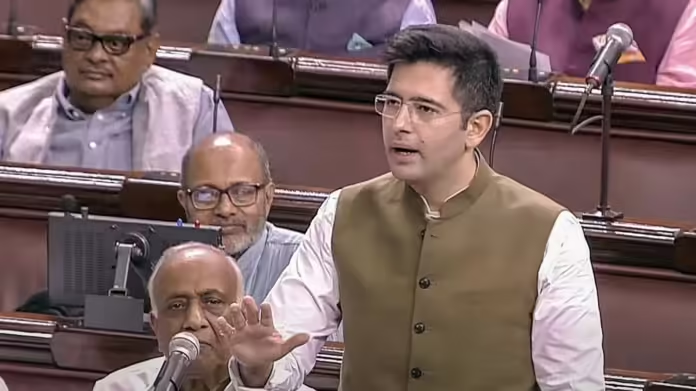The Indian Union Budget of 2024-25 has ignited a storm of criticism, with the Aam Aadmi Party’s (AAP) Raghav Chadha leading the charge. Chadha’s incisive critique unveils a stark reality: Indian citizens are burdened with exorbitant taxes, yet the public services they receive are abysmally inadequate, reminiscent of those found in developing nations like Somalia.
Taxation Without Representation
At the core of Chadha’s argument lies a simple but poignant illustration. For every 10 rupees earned, the Indian taxpayer surrenders a staggering 7-8 rupees in taxes, an exorbitant sum that encompasses income tax, GST, capital gains charges, and a myriad of other levies. The question that begs an answer is: what becomes of this substantial tax revenue? Why do the essential public services that citizens rely on, such as infrastructure, healthcare, transportation, and education, remain in a state of disrepair and inadequacy?
“We, in India, pay taxes like England but get services like Somalia,” Chadha laments, summarizing the situation with a stark and unsettling analogy. The irony is palpable, and the implications are profound. Despite contributing a significant portion of their income to the government’s coffers, Indian citizens are left with public services that fall far below the standards expected in a rapidly developing nation.
A Budget that Disappoints All
The budget’s shortcomings, according to Chadha, extend beyond its failure to address the needs of any particular segment of society. Typically, a budget presentation elicits a mix of reactions, with some sectors expressing satisfaction while others voice disappointment. However, in this instance, Chadha asserts that the government has managed the unenviable feat of disappointing everyone.
Chadha identifies three primary factors that have contributed to the government’s dismal performance in recent elections:
1. Rural Income and Inflation: India’s vast rural population, comprising approximately 60% of the nation, has witnessed a decade-long stagnation in income growth. Chadha decries the government’s failure to double farmers’ income, as promised under the Swaminathan Commission, and its inability to ensure fair prices for agricultural produce. This has led to a decline in rural income and a widening income gap.
2. Food Inflation: The country is grappling with rampant food inflation, with prices of essential commodities such as flour, milk, and yogurt soaring to unprecedented levels. Chadha questions the government’s lack of action to control inflation, particularly for those items that India once proudly exported. The rising cost of living is placing an undue burden on households across the nation.
3. Unemployment: Chadha expresses grave concerns over the rising unemployment rate, both in the formal and informal sectors. Citing a report by the Centre for Monitoring Indian Economy (CMIE), he points out that the unemployment rate in the unorganized sector stands at 9%, while in the organized sector it is a staggering 9.2%. The lack of job opportunities is a major concern for the nation’s youth and a significant drag on economic growth.
A Call for Inclusive Growth
Chadha concludes his speech with a series of suggestions to the government, urging it to increase investment in infrastructure, healthcare, and education. He also advocates for tax relief for the middle class and businesses to stimulate economic growth and job creation. The government, he implores, must focus on addressing the concerns of all sections of society and fostering inclusive economic development.
“The Union Budget of 2024-25 is a missed opportunity to address the pressing issues facing our nation,” Chadha concludes. “It is time for the government to prioritize the welfare of its citizens and work towards building a more just and equitable society.”

